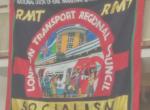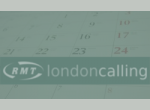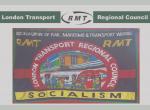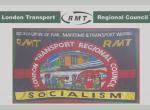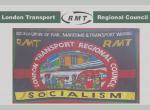1. The name of the Regional Council shall be the London Transport Regional Council (LTRC).
2. Under the rules of the national union and directed by the Annual General Meeting and the Council of Executives, the LTRC will be consultative and propagandist and will assist branches in the organisation and retention of members. It may also submit resolutions and appeals to the council of executives, grades conferences, the appeals court and annual general meeting. The LTRC does not have controlling powers over individual members, branches or officials.
The LTRC meetings are open to all members of the RMT and invited guests. Requests to invite speakers outside the RMT should be made to the President or Secretary in advance of the Regional Council Meeting.
3. The LTRC will meet on the last Thursday of each month excepting June and December at 150 Ossulston Street, Somers Town [or another agreed venue]
Special meetings to deal with important matters may be called by a resolution passed by the EC or requested at an ordinary meeting, or on a signed request by majority of Branch secretaries who are not in arrears with their subscriptions.
4. The meeting will start at 16:30 hours prompt, and close at 18:30 hours.
5 There shall be a President, Secretary, Vice Chair, Assistant Secretary, Financial Secretary, Membership Secretary, Political Officer, Black and Ethnic Minority Members Officer, Women’s Officer; LGBT Officer, Young Members’ Officer and LU Learner Reps' Co-ordinator, who will be elected at the LTRC Annual General Meeting. There will also be two auditors and two trustees also to be elected at the AGM. The LTRC AGM will be held in February. Vacancies will be filled at the soonest opportunity.
6. All candidates for office shall be present at the time of nomination or submit in writing their consent to stand. Voting at LTRC meetings and the LTRC AGM shall be based on a show of cards by branches.
7. The order of business shall be:
- Apologies for absence;
- Minutes of last meeting;
- Matters arising;
- Organisation & Recruitment;
- Council of Executives Report;
- Regional Organisers Report;
- Resolutions
- Reports
- Update on previous resolutions
- Any Other Business
There is a ‘timed agenda’ and if the time is ended then a request must be made through the Chair to continue talking on this item.
The EC Member gives their report about all matters, the RO gives their report about all local issues. There should be no duplication of items. Once both reports are given then the chair will ask for a show of hands for questions. The questions to either the EC Member or the RO should not be longer than 2 mins. Any point of information to either the EC Member or the RO should not be longer than 2 mins.
8. Items under Reports and Any Other Business will be notified to the President prior to the start of the meeting.
9. There shall be a code of conduct at all meetings of the LTRC. Meetings will be held within the norms of the trade union movement based on democratic discussion and debate free from threats, offensive behaviour, offensive language, or unruly conduct and all members present will be respectful to all those present regardless of personal characteristics or point of view. If a member is regarded to be in breach of these democratic norms then he / she shall be instructed to leave the meeting by a ruling from the President.
10. There shall be an LTRC Executive Committee which will meet on the second Tuesday of each month at 16:30 hours and close at 1800 hours. The Executive Committee shall ensure that the decisions of the Regional Council are carried out
11. The LTRC Executive Committee will consist of the Officers listed in Standing Order 5, all branch secretaries and chairs, all grades committee secretaries and chairs, plus 17 (preferably one for each branch) members elected at the LTRC AGM.
12. The ruling of the President on all matters shall be strictly adhered to but may be challenged by a motion that the Chairperson leaves the chair. This will be decided by a majority vote of branches present.
13. All branches at full branch meetings and the LTRC executive have the right to have resolutions placed before the LTRC for discussion and debate. All resolutions should be submitted to the Secretary of the LTRC by the time of the Executive Committee meeting to ensure they are tabled on the printed agenda of the LTRC. No resolutions or amendments are accepted from the floor.
14. A resolution must be a bona fide resolution from a Branch and is moved and seconded before any discussion takes place. Only one speech is allowed by anyone on the resolution (5 mins max for mover), except that the mover of the motion has the right to reply to the debate before the vote is taken. Any speaker to a resolution shall be limited to 2 mins; the proposer of any resolution shall be limited to 3 mins for their right of reply. This reply must not introduce a new matter and should be confined to responding to the points raised.
15. Emergency resolutions can be submitted for inclusion to the agenda but can only constitute a bona fide emergency if its subject relates to an issue that has arisen since the meeting of the Executive Committee.
16. An amendment to a resolution will only be allowed when it actually deals with the subject of the resolution eg. substituting, adding or deleting words in the original motion. It, too, must be moved and seconded before any discussion takes place. After the resolution has been moved and seconded, all further discussion on the motion will be suspended until the amendment has been dealt with. If the amendment is accepted, the motion and the amendment become the substantive agreed motion and are open to further amendment, before being finally voted on for adoption or rejection. Amendments must come from full branch meetings or the LTRC executive.
17. Resolutions once passed will be policy of the LTRC and cannot be overturned for a period of a further 3 months.
18. If Next business is moved then the meeting will immediately move to a vote on whether to move to the next business. The procedural motion must be moved, seconded and debated. If it is carried, the meeting moves on to the next item of business on the agenda. If lost, business is continued where the interrupted debate was left off.
19. A Point of order is an objection to a speech being made on the basis that a person is not speaking to the subject under discussion, is speaking on an issue outside the rules of the union, that the rules of debate are not being operated, offensive language is being used, or that the Standing Orders are not being complied with.
20. All branch funds received from RMT Head Office are the responsibility of the LTRC Secretary. The books will be inspected by the elected auditors at least twice a year and a financial report will be given at the AGM.
21. Once agreed, these standing orders can only be changed at an AGM and by 2/3rds majority.
22. The Regional Council will establish grades committees where appropriate.
(a) Each grades committee should adopt standing orders governing its functioning, including titles and roles of appropriate officers, which should be endorsed by the Regional Council.
(b) Each grades committee must hold an Annual General Meeting during the same month as the Regional Council AGM, with a Regional Council officer in attendance. The AGM will elect the grades committee's officers, and the election result will be reported to the Regional Council AGM.
(c) Each grades committee should agree a recruitment and organising plan at its AGM each year, and submit it to the Regional Council for endorsement and appropriate resourcing.
- 3746 reads


